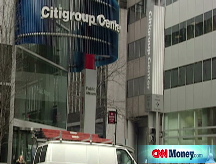Dollar falls against euro, pound
Government efforts to aid troubled banks revive the market's appetite for more risky assets.
NEW YORK (CNNMoney.com) -- The U.S. dollar fell against the euro and the pound Friday as the government stepped up its efforts to aid troubled banks and boost the ailing economy.
The euro rose 1.4% to $1.3294 from $1.3154 late Thursday in New York, while Britain's pound bought $1.4742, up from $1.4663.
Against the yen, the dollar declined 1% to ¥90.57. But the Japanese currency fell more than 2.2% against the euro to trade at ¥120.47.
"Government backstops, stimulus packages and presidential inauguration optimism is helping offset the gloom emerging from the raw data," said Ashraf Laidi,chief market strategist at CMC Markets, in a research note.
Many investors view the dollar as a safe alternative to more economically sensitive assets such as stocks or high yielding currencies. As a result, the greenback often falls when investors are more optimistic about the economy and therefore more willing to take risks.
The traditionally high-yielding euro and pound had been under pressure in previous sessions as turmoil in the banking sector undermined investors' appetite for risk. But the sentiment changed Friday as the government expanded its efforts to aid struggling banks.
"Risk appetite remains propped by another U.S. government back stop to a U.S. bank, this time to Bank of America's efforts in absorbing Merrill Lynch," Laidi said.
The U.S. Treasury will extend $20 billion more to Bank of America (BAC, Fortune 500) to help it absorb losses associated with its purchase of ailing brokerage Merrill Lynch. It will also guarantee $118 billion of assets at the bank.
Meanwhile, Senate lawmakers on Thursday effectively approved President-elect Barack Obama's request to access the second half of $700 billion Troubled Asset Relief Program.
Also on Thursday, House Democrats released an expansive economic recovery plan, saying it is central to stemming what has become the worst economic crisis in decades.
The plan - the American Recovery and Reinvestment bill - calls for $550 billion in spending and aid to states and $275 billion in tax cuts.
Friday's advance comes amid a mixed bag of economic reports.
The Labor Department's Consumer Price Index, a measure of inflation, declined a seasonally adjusted 0.7% in December from the prior month. It was the third consecutive decline and was led by a sharp drop in energy prices.
On an annual basis, CPI edged up 0.1% in 2008, the weakest annual increase since 1954.
Striping out volatile food and energy costs, however, the index was unchanged.
A separate report showed that consumer confidence unexpectedly increased in January.
The Reuters/University of Michigan index of consumer confidence rose to 61.9 in January from December's 60.1. While the reading was above economists' forecast of 59, the index remains at historically low levels.
Meanwhile, figures from the U.S. Federal Reserve showed that industrial production dropped by a bigger-than-expected 2% in December.
Industrial production was down 7.8% versus December 2007, the biggest drop since September 1975, as the global recession weighs on the manufacturing sector. ![]()



